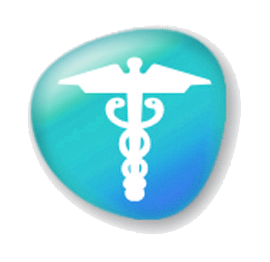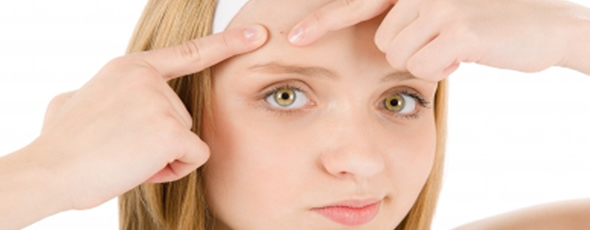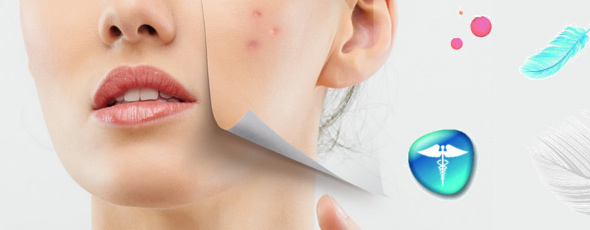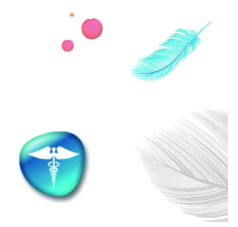What are the types-categories of acne?
Acne is the most common dermatological problem in teenagers. It is a condition of the sebaceous glands of the skin and the duct (channel) through which their contents (called sebum) are channeled to the surface of the skin. It is caused by an overproduction of sebum, blocking this duct, while the condition is aggravated by a microbe called acne propionate, which causes the inflammation. These glands are mainly found on the face (forehead, cheeks, chin), back and chest, where the increased oiliness of the skin is observed.
We can divide acne into three categories. In fagesoric acne, the image of "stuffed" skin with increased oiliness, dilated pores, non-smooth appearance, with pimples (closed pimples) and blackheads (open pimples) prevails. In Inflammatory acne where painful lesions with pus, redness and inflammation prevail. End in cystic acne where the deeper lesions (cysts) prevail. Acne is a chronic problem and can shift from one category to another.
TDoes it cause acne?
Acne is usually associated with the hormonal changes that accompany the onset of puberty. The hormones that are mainly related to acne are androgens which lead the sebaceous glands to overproduce sebum which also brings oiliness. That's why acne occurs only in oily skin. However, the etiology of acne is more complex, as the blockage of the hair follicle (due to a keratinization disorder) and a bacterium, the "acne propionate bacterium" (which is why some clinical forms of acne are significantly helped by antibiotic drugs) are also involved. Other less frequent causative factors are the taking of certain drugs and mainly steroids (eg anabolic doping or cortisone), the use of inappropriate cosmetics, occupational acne (in workers who come into contact with mineral oils), tropical acne (in workers in areas with excessive heat and humidity)
Common acne. The psychosocial and psychological effects of the disease
Acne is a very common disease and its potential to cause significant psychological effects was first described at least 55 years ago.
"There is no disease that causes more psychological trauma, inability to adapt between parents and children, more general insecurity and feelings of inferiority, and more mental anguish than common acne."
1.Acne and the treatment of acne scars are the main reason for visits to the dermatologist.
2 Although most cases appear in adolescence (70% -87%), it can often continue into adulthood.
3 Acne can affect any age group, and those with post-adolescent acne are the ones who are increasingly visiting a dermatologist's office in search of treatment. In one study nearly 18% of women were found to have late-onset disease, with onset after the age of 25 years.
4. The number of adults with acne appears to be increasing, although the reasons are unclear.
5 Although acne appears to be simply a cosmetic problem, its effects can be much more serious, causing a heavy emotional and psychological burden for patients.
Teenage acne
Teenagers are psychologically more vulnerable. They are sensitive to the changes that occur in their body and appearance. Acne usually affects young people at a time when they are undergoing the greatest psychological, social and physical change. Studies have shown that acne appears to reduce adolescents' quality of life and affect their overall self-esteem.7,8 30% -50% of adolescents experience psychological problems associated with their acne, 8 and although the interaction is complex it may relates to developmental issues of body image, socialization, and sexuality.
Acne is the most common visible skin disease in teenagers. Unlike most other dermatological conditions that may be limited to areas covered by clothing, acne is often visible on the face further affecting body image and socialization issues. Therefore, it is not surprising that a vulnerable individual with facial acne may develop significant psychosocial disability. Many patients with acne have problems with their image and interpersonal relationships. The effects are exacerbated by teasing or sarcasm, criticism of others, and feeling left out.10 Embarrassment is often a prominent response of acne patients. They usually experience social anxiety and may generally avoid activities that draw attention to their condition.11 These feelings are often related to the fear of criticism of their face, and the social ideal of perfect skin makes their appearance the most important factor. .10 Teens with acne feel uncomfortable and avoid eye contact, grow their hair long to cover the face, and girls often use makeup to minimize the appearance of acne.12 Studies have shown that acne can significantly influence her choice of clothing in teenagers with acne.13,14
Effects of acne depending on severity
The relationship between acne severity and the emotional distress it causes is poorly understood.15 A student study showed that acne patients experienced worsening of their disease during exams. An increase in acne severity was significantly associated with increased levels of stress (p < 0.01).16 A recent questionnaire-based study conducted among 1,560 adolescents in Greece found a positive correlation between acne and stress. self-reported by respondents (P <0.0001) .13
It is generally considered that there is a linear relationship between the clinical severity of acne and the deterioration of quality of life. However, this worsening also depends on a person's ability to cope with the various problems as there are people with an objectively minor acne problem who may experience severe subjective dysfunction, greatly affecting their quality of life.17 Thus, acne can to have a major impact on patients' lives, often independent of its severity. 18
Severe acne is associated with increased depression, anxiety, poor self-confidence, and poor self-esteem.19,20 Psychiatric symptoms are more common in more severe acne and in the advanced stages of adolescence.21
Acne is linked to an increased risk of depression, anxiety and suicidal tendencies, and there are some interesting gender differences.
It has been suggested that patients with moderate to severe acne suffer from poor body image, low self-esteem, social isolation and activity limitation. As an emotional impact, increased levels of anxiety, anger, depression, and frustration are also reported.27 In a study of 615 school-aged children with acne, adolescent girls were found to be more vulnerable than boys to the negative psychological effects of acne, and levels of anxiety were higher .27 Considering the fact that acne causes psychological pain, it can also affect the social, professional and academic performance of adolescents.
In addition, suicidal ideation (approximately 6% -7% in acne patients) and suicide attempts related to the negative psychosocial effects of acne have also been documented.28,29 A study involving 480 patients with various skin diseases revealed that the highest incidence of depression and suicidal ideation was found in patients with severe forms of acne and severe psoriasis, while patients with mild and moderate forms of acne were at the same levels as people suffering from atopic dermatitis, moderately severe forms of psoriasis and alopecia areata.30
Acne negatively affects quality of life, and there is not always a correlation between the severity of acne and its impact on quality of life. The magnitude of anxiety and depression is proportional to the degree of impairment of quality of life due to acne.25 Patients with greater social sensitivity experience poorer quality of life compared to other patients with the same severity of acne.32 Anger, similarly, is associated with poorer quality of life and less satisfaction with treatment, independent of other variables.33
Studies on the psychosocial impact of acne have documented dissatisfaction with appearance, embarrassment, self-esteem, and lack of confidence in acne patients. Social dysfunction has also been observed, including concerns about social relationships with the opposite sex, public appearances, interacting with strangers, and professional opportunities.21,35,39 In addition, acne is associated with anxiety, depression,40 feelings of anger33 and reduced body satisfaction.41 It has been shown to be negatively associated with the intention to participate in sports and exercise, perhaps as a result of the fear experienced by acne patients of the criticism they will receive from those around them.13 In a study among students in Scotland, 10% avoided swimming and other sports because of embarrassment caused by acne.17 Acne has also been shown to negatively affect school and extracurricular activities.13 , 17 Self-esteem issues are also likely to underlie the highest rates of unemployment among acne patients, however there is also a bias according to which patients people with acne are more likely to be rejected by a prospective employer.42 there are also studies that report that up to 20% of teenagers with acne face problems forming relationships because of their acne, 12 or express concerns about socializing, their appearance in public places and their contact with the opposite sex.44 Acne and the effects it causes on the appearance and therefore also on the self-confidence of the patients seem to be related to the depression, social withdrawal and anger they experience. 38.45
It can create a vicious cycle: it is not only acne that can lead to emotional distress, but the stress caused to an acne patient can worsen the skin condition itself at a time when patients are less able to face extra stress.42,46
During adolescence, the incidence of acne increases with age and growth. In girls, the onset of menstruation is associated with an increased incidence of acne.26 The only relationship between gender and acne in the literature is that quality of life and sexual satisfaction worsen in women with PCOS and acne.50
The effect of acne on a particular patient is not always easy to quantify clinically. It has been reported that both women and men find the effects of acne on appearance to be the most bothersome aspect of their disease, and the negative effects of acne occur in both older and younger patients.51 Even mild acne can can be a significant problem for some patients, worsening their quality of life and, in some cases, their social functioning.44,52
Reduction of psychosocial effects of acne
Acne is not an insignificant disease compared to other chronic diseases.53 Even if acne is not associated with severe morbidity, mortality, or physical disability, it can nevertheless have significant psychological and social effects.54 Reducing the psychosocial impact of acne is considered a from the guiding principles for its clinical management. 37,38 Effective and safe treatments for acne are available today, but there are still many who do not consider acne a problem that needs to be treated.55 All of the above effects of acne highlight the importance of prompt and proper treatment as well as psychiatric control and of supporting acne patients. The improvement of acne after appropriate treatment has been shown to lead to increased self-esteem, self-confidence and social functioning.
The social, psychological, and emotional harm that can result from acne, especially in its more severe clinical forms, has been reported to be similar to that associated with epilepsy, asthma, diabetes, musculoskeletal pain, or arthritis.41 ,47,53,56-58 Patients may be more prone to depression, anxiety, social withdrawal, and anger, not to mention that acne scars can lead to lifelong self-esteem problems.44
What role does diet play in acne?
Contrary to what many believe, diet does not cause acne. That's why no diet, however strict, is going to "cleanse" a person suffering from acne. However, acne sufferers report that eating certain foods makes their acne worse. Sugar and simple carbohydrates can trigger acne breakouts. The foods you should watch out for are the following:
– Fatty foods such as Potatoes, Pizza, French fries and cookies
– White bread, pasta and potatoes (starchy foods)
– Carbonated soft drinks (lots of sugar)
– Probably dairy products
These foods increase blood glucose levels, resulting in insulin secretion. Insulin promotes increased oiliness of the skin and thus the pores become clogged.
Also, sudden weight gain can worsen acne.
What is the best treatment for acne?
Each acne patient must be treated as an individual case. In general, however, for mild acne, local treatment is sufficient (along with some changes in the way you care for your face), while moderate and severe acne requires systemic treatment (pills) and/or a combination of local and systemic treatment. In cases of acne where there is a hormonal problem that causes and worsens it, it is imperative that this be addressed first, otherwise the acne treatment will never be effective enough.
Photobionic treatment of acne with the KLOX system
The biophotonic treatment system of the Canadian company KLOX is a new innovative treatment for the treatment of severe cases of acne. It is aimed at severe cases of acne who do not wish to be treated with isotretinoin pills (pill treatment requires monthly laboratory tests, dietary restrictions and avoiding alcohol. Also, avoiding pregnancy for at least 1 year). In contrast, the KLOX "lamp" treatment (a multi-LED lamp that produces blue light with a wavelength of 446nm) uses a chromophore gel (which acts as a wavelength converter) which converts the blue light emitted by the lamp into a blue range , green yellow and red wavelengths of light which cause the release of oxygen free radicals which work therapeutically. Blue light also kills propionate acne bacteria by activating the bacteria's porphyrins. This treatment does not require the controls and limitations that treatment with isotretinoin pills has and can be done at any age.
The treatment lasts a total of 12 weeks (24 treatment sessions) and requires two sessions per week (which must be separated in time, e.g. Monday and Thursday), while each session lasts only 30 minutes!
I pay a lot of attention to my cleanliness and wash my face morning and night. Why does my acne persist?
Acne is not caused by insufficient cleanliness of the skin! So washing your face alone cannot cure acne. But washing the face (with special cleansing products for skin with acne) is an integral part of the treatment because it removes excess oil from the skin. If there is a greasy film on the face, no local treatment (creams, gels) can penetrate and be effective. Also the skin is "clogged" and the acne itself worsens.
What is the role of facial cleansing in the treatment of acne?
"Deep" cleansing of the face helps a lot in treating acne breakouts. Cleansing can be called deep but it is not deep, only the epidermis is affected. After the impurities are removed with emulsion and lotion, the face is exfoliated to remove dead cells and to better extract sebum. With the help of steam from a special machine, we open the pores with gentle movements and finish the treatment with a suitable antiseptic and soothing mask. In cases of cystic acne, we avoid deep cleaning because the pressure can lead to the opening of the cyst inwards and movement of the inflammation inside the skin. For this reason, cleaning should only be done by a trained beautician or dermatologist. After deep cleaning, the oil on the skin is reduced, the hair follicles ("pores") are cleaned so the skin does not become inflamed, the skin breathes better and responds better to treatments with topical anti-acne drugs and skin cosmetics
Does stress cause or worsen acne?
Stress appears to play a role in the onset or worsening of acne, as stress hormones (mainly cortisone) along with testosterone cause an increase in sebum production.
I never had acne as a child-teenager. Is it possible to have acne in adulthood?
Yes, there are forms of acne that either continue into adulthood (there was severe acne during adolescence) or start from scratch in adulthood. In cases where acne starts at an older age, a hormone test should be done (to rule out conditions such as cysts and ovarian tumors).
In the case of polycystic ovary syndrome there is an increased production of androgens which lead to the appearance and worsening of acne. Many women experience a flare-up of acne around the age of 30 when they stop taking birth control pills because they want to have children (the birth control pills didn't let the acne flare up). Other causes are the use of inappropriate cosmetics (e.g. "heavy" cosmetics for mature skin at younger ages) which cause or worsen acne, "painting" for many hours every day, especially if the woman does not wash her face thoroughly before falling for sleep. Also overweight and obese women have increased androgen production in excess adipose tissue (which converts estrogen to androgens)
Does the sun help acne?
Many patients report an improvement in their acne during the summer months and especially during their holidays at the sea. The sun can help reduce acne thanks to its mild anti-inflammatory action. Tanning also hides many of the acne scars and a false improvement appears! Also, the improvement of acne during the summer can be related to other reasons such as the iodine of the sea water, the reduced stress of the holidays, etc. But before deciding whether the sun really helps, we must always take into account the immediate and long-term risks for the skin that sun exposure hides (increased risk of skin cancers, premature aging of the skin). In addition, most acne treatments increase the skin's sensitivity to UV radiation and should not be combined with excessive sun exposure.
What kind of cosmetics and cleansers should someone with acne use?
For acne patients there are today specialized lines of skin cosmetics which are best to look for in pharmacies. In general, we should prefer products that have the label "oil free product" or "for oily acne-prone skin". This applies to all products related to the face such as cleansers, sunscreens, moisturizers, make up, etc.
Why is it forbidden to "tease-press" acne lesions with my hands?
We advise our patients, as much as possible, not to touch the acne lesions with their hands. This is because the pressure pushes some of the inflammatory contents of the lesion deeper into the skin. In other words, we ourselves carry the problem deeper into the skin! As you know, the deeper acne is, the more difficult it is to treat and the greater the chances of leaving behind scars (acne scars).
Is there a cure for acne scarring?
In addition to traditional treatments (dermabrasion with microcrystals, chemical peeling) today we have specialized targeted treatments that destroy the acne scar (which is located inside the skin under the "pimple" we see. This destruction is done with the fractional CO2 laser either with fractional RF (radiofrequency) or with microneedling. In the same session we also apply autologous PRP mesotherapy which offers growth factors for faster skin regeneration. The treatment of this serious aesthetic problem must be done when we have treated the active phase of acne and always during the months with limited sunshine.
How long do I have to wait to see the result of the acne treatment?
Acne is a chronic problem and the effect of treatment cannot be extremely immediate. It usually takes at least 4 weeks for topical treatment to start showing its effect. But even systematic treatment with pills requires a corresponding period of time. Acne patients should know this and not rush and get discouraged during their treatment.
My face has cleared up. Can I stop acne treatment completely?
Acne treatment should be varied only after consultation and supervision by the dermatologist. Patients who abruptly stopped the treatment on their own initiative, very soon found themselves with a new flare-up of their acne. Also, the dermatologist knows which treatments are suitable for maintaining the good result, which treatments are suitable for summer, etc.
Acne and dairy products. Are they related?
Research indicates that dairy products, and especially milk, contribute to the onset and worsening of acne. Further research is needed to confirm the exact link between the two, however it is possible that the hormones found in cow's milk are triggering the symptoms. This hypothesis is based on studies carried out on the milk - which contained hormones - of pregnant cows. This milk contains increased levels of progesterone and other steroid hormones which stimulate the sebaceous glands and worsen acne.
Acne and chocolate. Are they related?
There is no scientifically proven study that proves that chocolate causes acne. Of course, the consumption of any food that is rich in fat and sugar (foods with a high glycemic index), such as chocolate, is related to the appearance of acne. Cocoa, on the other hand, seems to improve acne because unlike milk chocolate, it does not contain butter, sugar and whole milk, but contains ingredients that help with the proper functioning of hormones and the appearance of the skin. In conclusion, chocolate as a food is guilty because it belongs to the category of fatty and sweet foods. The rest of the foods belonging to this category are equally guilty. Prefer dark rather than milk chocolate or white chocolate. Dark chocolate or couverture contains flavonoids (which are antioxidants) because of the cocoa it contains unlike milk and white.








